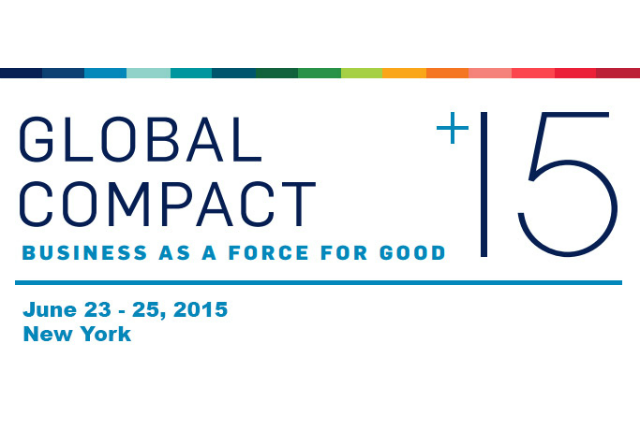UN Global Compact Celebrates 15 Years
On Thursday 25 June Mary Robinson spoke at the UN General Assembly during a special session to mark the 15th anniversary of the launch of Global Compact. More than 1,000 participants gathered in New York to mark the occasion. The Global Compact was created to align corporate practices with universal principles underpinned by the vision of a sustainable and inclusive global economy that delivers lasting benefits to people, communities and markets.
The event celebrated the progress made to date – from an initial 44 business partners in 2000, the membership of the Global Compact has grown to 8,041 business participants and a further 4,449 non-business participants. However, amidst the acknowledgement of the successes to date there was also recognition that entrenched business mind-sets were slow to change and more would need to be done to realise the ambition of the Global Compact’s vision, particularly in the face of climate change and worstening global inequality.
In her speech, Mary Robinson reminded participants that the strength of the Global Compact stems from a partnership between business, trade unions and civil society and encouraged those gathered not to lose sight of the participation of the non-business actors. She highlighted the grave harms inflicted on vulnerable people and communities by corporations who neglect the social dimensions of their operations and called on all corporations signed up to the Global Compact to abide by UN Principles on Business and Human Rights.
Unilevier CEO, Paul Polman, who also spoke at the event said that members of the UN Global Compact are pioneering a new blueprint as to what business should look like in the 21st century. But he acknowledged that changes were too slow in coming. “We are making incremental progress when we actually need transformative changes” he said. He called on business leaders to be motivated not simply by the opportunities, but also by the moral challenge presented by socially and environmentally sustainable business practice.
The event also saw the launch of a study on the progress made by the UN Global Compact to date. Called Impact – Transforming Business, Changing the World the report considers advances in corporate practices, operating environments and world views over the 15 year lifespan of the Global Compact and forecasts pathways to a sustainable and inclusive global economy. In all the talk of paradigm shifts, tipping points and synergies, Erika Karp possible summed up the aspirations in the room best when she said “Corporate sustainability will simply be called corporate excellence some day”.
Related Links
Webinar on Business and Climate Justice co-hosted by the UN Global Compact and MRFCJ


